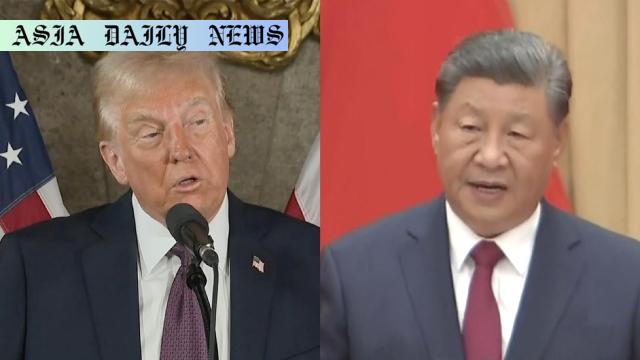Trade Deal: Trump eyes a wide-ranging deal with China, incorporating nuclear security and major investments in US industries.
- Trump considers a new broad trade deal with China.
- The deal may include nuclear weapons security discussions.
- China and the US recently imposed new tariffs on each other.
- Some US officials see Chinese investments as a security risk.

President Trump Explores a Comprehensive Trade Deal with China
President Donald Trump has reportedly shown interest in negotiating a far-reaching trade deal with China, aiming to address both economic and security concerns. According to a report by The New York Times, the proposed agreement would involve significant Chinese commitments to invest in the United States and to purchase more American goods. However, the scope of the deal extends beyond traditional trade matters to include sensitive topics like nuclear weapons security. This ambitious initiative indicates the Trump administration’s effort to leverage economic dialogue to achieve broader strategic goals.
Economic and Security Dimensions of the Proposed Deal
The core of the proposal includes encouraging substantial Chinese factory investments in the United States, which could create opportunities for economic collaboration. However, this aspect of the plan is raising concerns among certain members of the administration. Figures like Secretary of State Marco Rubio and National Security Advisor Mike Waltz believe that allowing such investments could pose national security risks. Their reservations highlight the tensions between economic benefits and strategic vulnerabilities in US-China relations.
Escalating Tariffs Create Urgency for Negotiations
Meanwhile, the trade relationship between the two nations remains tense. Earlier this month, the Trump administration implemented an additional 10% tariff on all imports from China starting February 4, prompting retaliatory measures from Beijing. China imposed higher tariffs on key US exports such as coal and liquefied natural gas beginning February 10. These actions underline the urgency for a resolution that could ease the escalating trade war, which has resulted in significant economic repercussions on both sides.
Trump’s Personal Approach to Diplomacy
One notable feature of Trump’s strategy is his preference for direct, high-level negotiations. The President reportedly envisions discussing complex issues like nuclear weapons security directly with Chinese President Xi Jinping. This approach aligns with Trump’s history of prioritizing personal diplomacy to achieve international agreements. However, the feasibility of addressing such wide-ranging issues in a single agreement remains uncertain, given the deep-seated differences between the two nations on economic policies and security priorities.
Challenges and Opportunities Ahead
While the prospect of a new trade deal with China offers hope for improved economic ties and reduced tensions, numerous challenges lie ahead. Balancing security concerns with the potential economic gains from increased Chinese investment requires careful consideration. Additionally, integrating nuclear weapons security into the trade discussions adds complexity to an already intricate negotiation process. The success of this initiative will depend on the clarity of objectives, mutual trust, and the willingness of both sides to compromise.
In conclusion, President Trump’s proposed trade deal with China represents both an opportunity and a challenge. By addressing core economic issues alongside global security concerns, this initiative could potentially reshape the trajectory of US-China relations. However, achieving such an ambitious goal will require navigating significant domestic and international obstacles, with far-reaching implications for global economic and geopolitical dynamics.



Commentary
The Ambitious Scope of Trump’s Trade Deal Vision
President Donald Trump’s interest in a new, wide-ranging trade deal with China demonstrates his signature approach to diplomacy—bold, unconventional, and expansive. By including nuclear weapons security in a trade agreement, Trump is clearly signaling his belief in uniting economic and security concerns in one comprehensive package. This is an intriguing strategy, one that could fundamentally shift how nations engage with each other on multi-dimensional issues.
Economic and Political Trade-Offs
While the potential economic benefits of increased Chinese investment in the United States are significant, the political and security trade-offs cannot be ignored. Critics within the administration have voiced legitimate concerns about the implications of allowing deeper Chinese footholds in American industries. Such investments might stimulate jobs and growth but could also increase vulnerabilities in critical infrastructure sectors.
The Complications of Including Security Issues
Integrating nuclear weapons security into trade discussions, while ambitious, may also present difficulties. These are fundamentally different issues, and tying them together complicates negotiations. Moreover, combining economic incentives with strategic concerns can polarize stakeholders, both domestically and internationally. The extent to which such a sweeping deal is feasible depends on careful planning and execution.
Hope and Skepticism
As the trade war continues to damage both economies, the prospect of a resolution through a comprehensive agreement offers hope. However, history suggests that China and the United States often struggle to align their priorities. While optimism is warranted, skepticism is also necessary when evaluating the realistic outcomes of such a grand vision.
Ultimately, Trump’s initiative reflects his willingness to think big and aim high. Whether his proposal materializes remains to be seen, but it undoubtedly adds an interesting dimension to the US-China dialogue, leaving stakeholders waiting to see how these discussions unfold.